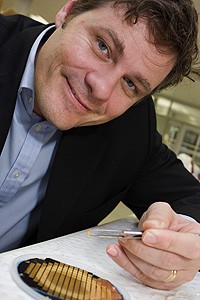Oct 29 2008
UQ's Australian Institute for Bioengineering and Nanotechnology (AIBN) has received a $100,000 Grand Challenges Explorations Grant for Innovative Global Health Research.
 Professor Kendall
Professor Kendall
The grant, from the Bill and Melinda Gates Foundation, will support an innovative global health research project conducted by Professor Mark Kendall, titled "Nanopatch Delivery of DNA-Based Malaria Vaccines to Skin: Precisely Targeting the Skin Immune System for Radically Improved Vaccines."
Professor Kendall's project is one of 104 grants selected from nearly 4000 proposals –announced by the Gates Foundation for the first funding round of Grand Challenges Explorations, an initiative to help scientists around the world explore bold, new solutions for health challenges in developing countries. The grants were provided to all levels of scientists in 22 countries and five continents.
To receive funding, Professor Kendall showed how his idea falls outside current scientific paradigms and could lead to significant advances in global health if successful.
Professor Kendall leads a team researching and developing nanopatches to target immunologically-sensitive cells located in the outer layers of the skin, as a new and better way of vaccinating against infections disease.
"Nanopatch devices are painless, needle-free, easy to use, cheap to manufacture and because they use a dry-coated vaccine will not require refrigeration, which makes them very attractive for use in the developing world," he said.
"I am very excited to receive this grant and my team is working very hard to meet the proof-of-concept milestone.
"By achieving this in the first 12 months, we will potentially be eligible for a further grant of US$1 million to move the project toward vaccine testing in humans."
Grand Challenges Explorations is a five-year $100 million initiative of the Gates Foundation to promote innovation in global health. The program uses an agile, streamlined grant process – applications are limited to two pages, and preliminary data are not required. Proposals are reviewed and selected by a committee of foundation staff and external experts, and grant decisions are made within approximately three months of the close of the funding round.
The AIBN is a multi-disciplinary research institute based at UQ, which brings together the skills of world-class researchers in the areas of bioengineering and nanotechnology to produce positive health and environmental outcomes such as biomedical delivery; bio-devices; tissue regeneration; and cell therapies.